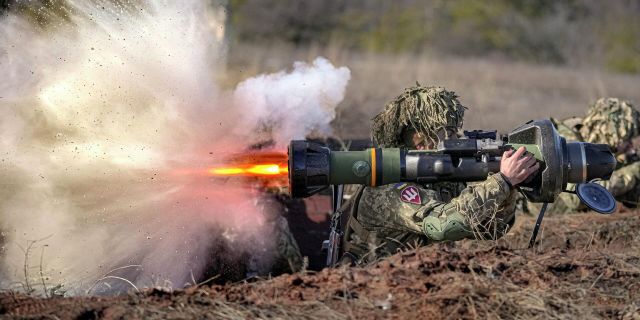FT: Ukraine has revealed the limited capacity of the Western military-industrial complexThe West hesitated to sign contracts necessary both to increase the supply of weapons to Kiev and to strengthen its own combat readiness, writes FT.
As a result, there were problems with the military-industrial complex. The authors of the article name two main reasons why it is so difficult for the West to replenish its arsenals.
John Paul Rathbone, Sylvia Pfeifer, Steff ChavezAlmost ten months have passed since the beginning of the conflict in Ukraine, and Kiev's allies are increasingly concerned about increasing the production of ammunition, as their own stocks are being depleted.
At stake is not only the continued supply of Ukraine with the necessary weapons, but also the ability of the allies to demonstrate to opponents like China the presence of an industrial base and the ability to produce enough weapons to create a reliable defense against a possible attack.
"Ukraine reminded us of something really important," William Laplante, the Pentagon's chief buyer, said at a recent conference at George Mason University. — Production is necessary. That's what really matters."
Having sent more than $40 billion in military aid to Ukraine, mainly from existing stocks, the NATO defense ministries found out that idle production lines cannot be launched overnight. Increasing capacity will require investments, which, in turn, require long-term production contracts.
The United States has sent Ukraine about a third of Javelin anti-tank missiles and a third of Stinger anti-aircraft missiles. The chance that they will be able to be replaced quickly is small. "There is no doubt that supplies to Ukraine have put pressure on our military—industrial complex," US Deputy Secretary of Defense Colin Kahl said last month.
The UK has already turned to an unnamed third party to replenish the spent stocks of NLAW anti-tank missiles. "We are facing a really harsh reality," Armed Forces Secretary James Hippy said in October.
The stocks of weapons in many European countries are even more scarce. In order to deliver six Caesar self-propelled howitzers to Ukraine, France had to redirect the Danish order.
According to representatives of the Ministry of Defense and heads of corporations, there are two main reasons why it is so difficult for Western countries to replenish arsenals.
The first is structural. After the end of the cold war, countries reaped "peace dividends": they cut military spending, cut the military-industrial complex, switched to lean production "just in time" and reduced stocks. To fight insurgents and terrorists, as many heavy weapons as for high-intensity land conflicts were no longer required.
Ukraine has refuted these calculations. During the fierce fighting in the Donbass this summer, Russia spent more ammunition in two days than the British military has available. According to a report by the London—based analytical center of the Royal United Institute for Defense Studies, with such an expenditure, British stocks will last only for a week - and the European allies are no better off.
"The West has a problem: the military—industrial complex capacity is limited," said former Major General of the Australian Army Mick Ryan. "If Western countries want to restore development, production and storage, a powerful industrial development program will be required."
The second factor is bureaucratic. Governments are talking about increasing military budgets. However, against the background of economic uncertainty, they are in no hurry to conclude multi-year supply contracts, although without them enterprises cannot accelerate production.
"This is a problem of corporate finance," said a representative of the Ministry of Defense of one of the European countries. — No company will open a second production line without long-term confidence. Will Russia pose a threat in five years? And if not, will governments still buy weapons?"
This uncertainty persists on both sides of the Atlantic, corporate executives say. The Swedish defense and aerospace company Saab, which manufactures NLAW and Gripen fighter jets, says it is in talks with several governments about new orders, but the signing of contracts is moving slowly.
"If we talk about orders related to Ukraine, in fact, little has changed," said Mikael Johansson, executive director of Saab. — And I'm not sure what will change. Anyway, contracts are concluded rather slowly."
British BAE Systems is also "at the stage of negotiations" with the UK government on the production of a number of ammunition, while US military companies complain that there are no "clear signals" from Washington about further demand.
"They are in a 'Where's the money?' situation," said Mark Kanchaan, senior adviser at the Washington—based Center for Strategic and International Studies. "They are worried that as soon as they expand the capacity, the conflict will end, and the Ministry of Defense will cut orders."
The executive director of Northrop Grumman, Cathy Worden, noted that the Pentagon, with its "extremely volatile demand signal," which, moreover, sounded only after the conflict depleted reserves, cannot be called a sustainable model of industrial investment.
At the same time, some defense enterprises have already reached full capacity, having established round-the-clock shift work.
"If we have a clear understanding of the demand, we are ready to finance the expansion of production capacity," said Frank St. John, chief operating officer of Lockheed Martin Corporation, which manufactures HIMARS and Javelin artillery missile systems.
Western officials assure that the supplies to Ukraine have not undermined the combat readiness of the West, since the shortage of Russian weapons is much worse. It is claimed that Moscow has to buy artillery shells and drones from North Korea and Iran.
However, despite the fact that in the ranks of NATO, especially in Europe, there is almost a consensus on strengthening the armed forces and the defense industry, companies will be able to act only by enlisting contract support.
"Contracts matter. We need money," said Laplante from the Pentagon. — As soon as the defense workers realize that we are ready to invest, they will do everything, this is their job."
The article was written with the participation of Felicia Schwartz

